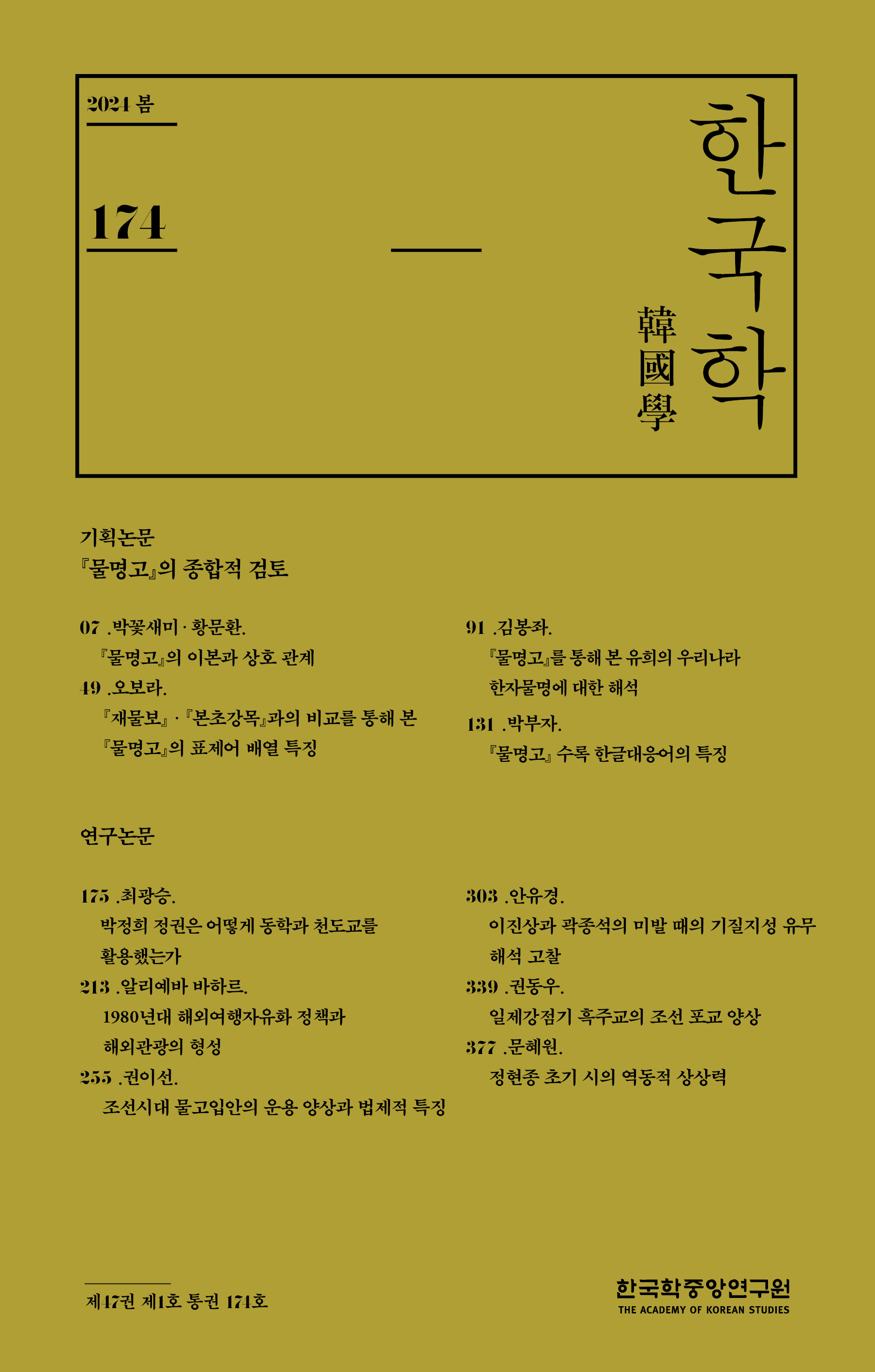
- P-ISSN 2671-8197
- E-ISSN 2733-936X
.jpg)
The purpose of this paper is to prove that both Korean and Japanese ‘Manchuquo Networks’ played a critical role in implementing so-called Japan's ‘reparation business’ in Korea. The term, Japan's ‘reparation business,' is used because Japanese businesses as well as Japanese government, were the largest beneficiaries for Japan's reparation for its invasion and colonization in Korea and other Asian nations before and during the Second World War. A series of the bilateral negotiations over their diplomatic normalization frequently halted because of difficult definition and estimation of Korea's right of claim for Japan's colonization in Korea. Therefore, importance of unofficial negotiations largely increased. Members of Japan's ‘Manchuquo Networks,’ such as Nobusuke Kishi, Kazuo Yatsugi and Yoshio Kodama played a critical role in coordinating unofficial meetings with the Park, Chung-hee administration. They actively involved in this type of condonations because they could expect to be rewarded by Japan's ‘reparation business’ to be implemented in Korea after the two nations' diplomatic normalization and because they had already experienced to be rewarded through the ‘reparation business’ implemented in other Asian nations, such as Philippines, Indonesia and South Vietnam. In order for Japanese businesses to win business opportunities in Korea, those business personnel who belonged to ‘Manchuquo Network’ actively involved in lobbying activities for members of Park, Chung-hee administration. Japan's ‘reparation business’ in Korea gave a huge impact on Park, Chung-hee administration. The Park administration obtained more than 800 million US dollar of foreign investment from Japan, which was essential for Korea to construct industrial infrastructure. It would be true that the ‘reparation business’ contributed to constructing infrastructure, which was essential for Korea's national development; however, it also brought about corruption among the administration at the same time. This corruption occurred because each project were handled by contracts ad libitum. Therefore, Japanese businesses needed to lobby members of the administration in order to win business opportunities in Korea.
세계일보,
월간조선,
權逸, (1983) 玄海灘을 사이에 두고: 日本 속의 南과 北, 해외교포문제연구소출판부
김경일, (2004) 동아시아의 민족이산과 도시:20세기 전반 만주의 조선인, 역사비평사
김동조, (1986) 회상 30년 한일회담, 중앙일보
김민철, (1996) 만주국의 관료를 꿈꾸는 조선인 대동학원 출신자들, 민족문제연구
박정희시대 특별취재팀, (1998) 실록 박정희, 중앙M&B
박진희, (2002) 韓日국교수립과정에서 '韓-日인맥'의 형성과 역할, 역사문제연구소 학술대회 발표논문
신주백, (2002) 滿洲國軍 속의 조선인 군인들, 역사문제연구소 학술대회 발표논문
이원덕, (1996) 한ㆍ일 과거사 처리의 원점: 일본의 전후처리 외교와 한일회담, 서울대학교출판부
정우현, (2004) 실록 군인 박정희, 개마고원
Baldwin, Frank, (1973) Without Parallel: The American-Korean Relationship since 1945, New York: Random House
Johnson, Chalmers, (1982) MITI and the Japanese Miracle: The Growth of Industrial Policy 1925~1975, Stanford: Stanford University Press
Lee, Chong-Sik, (1985) Japan and Korea: The Political Dimension, California: Stanford Hoover Institution Press,
朝日新聞,
エコノミスト,
財界日本,
姜鷺鄕, (1966) 駐日代表部, 東亞PR硏究所出版部
淺田喬二, (1986) 日本帝國主義の滿洲支配, 時潮社
五十嵐仁, (2003) ?後政治の?情, 小?館
李鍾元, (1996) 東アジア冷?と韓米日?係, 東京大?出版?
太田修, (2003) 日韓交?, クレイン
共同通信社, (1996) 沈?のファイル, 共同通信社
小林進, (1977) 日韓ゆ着の?相: 元韓國情報部長金炯旭は語る, 政治經濟硏究會
小林英夫, (2005) 滿洲と自民?, 新潮社
椎名悅三郞追悼錄刊行會, (1982) 記錄 椎名悅三郞 下卷, 椎名悅三郞追悼錄刊行會
高崎宗司, (1996) ?? 日韓?談, 岩波新書
竹森久朝, (1976) 見えざる政府:兒玉譽士男とその黑の人脈, 白石書店
朝鮮問題硏究會(編), (1978) シリ?ズ日韓問題② 經濟ゆ着, 晩聲社
朝鮮問題硏究會(編), (1978) シリ?ズ日韓問題③ 軍事一體化, 晩聲社
日本工營株式會社, (1996) 日本工營50年史, 日本工營株式會社
每日新聞社政治部, (1976) 黑幕 兒玉譽士男, エ?ル出版社
矢次一夫, (1973) わが浪人外交を語る, 東洋經濟新報
山本剛士, (1983) 日韓關係と矢次一夫, 國際政治
山本有造, (2003) ?滿洲國?經濟史硏究, 名古屋大學出版會
(1961) 第38回?議院法務委員會, 第16號,